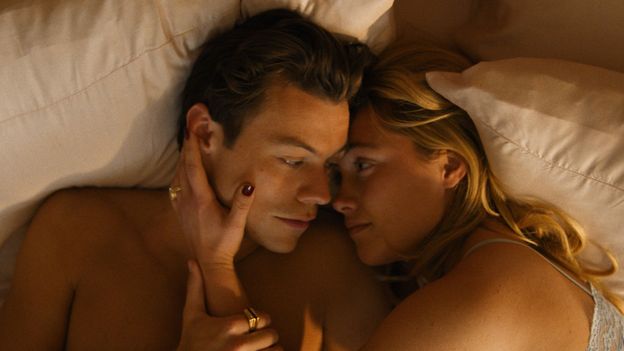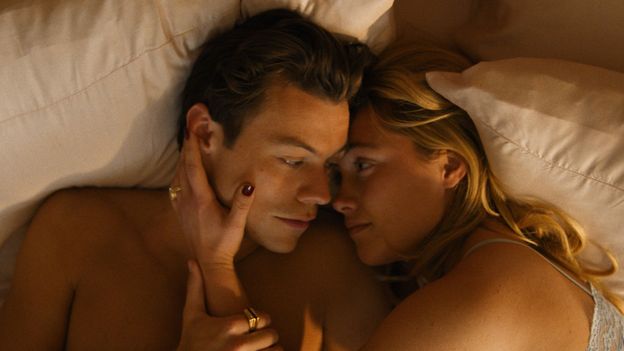Harry Styles’ new film is a big miss


“There is beauty in control. There is grace in symmetry. We move as one.” This is the mantra of Victory, an experimental company town in the mid-20th Century where men drive off into the desert to work on a top-secret project involving the “development of progressive materials” while their wives prep dinner, gossip and shop. Olivia Wilde’s second stint in the director’s chair holds a stiletto to the throat of 1950s optimism, taking the plastic off the metaphorical sofa to expose the dangers of deifying an era where women are second-class citizens. The issue with Don’t Worry Darling, however, is that it is frequently rudimentary and repetitious – hammering home the same basic point about gender politics while a dulled supporting cast fails to add much colour to the story’s margins.
More like this:
– ‘Brendan Fraser deserves an Oscar’ for The Whale
– Bones and All is ‘a blood-drenched Bonnie and Clyde’
– Bardo is a turkey from an Oscar-winning great
A lot of discussion around the film in the run-up to today’s Venice Film Festival premiere has been stoked by the controversy regarding the initial casting of Shia LaBeouf and the conflicting stories surrounding his subsequent departure from the project. He was then replaced by Harry Styles, who stars alongside Florence Pugh as Alice and Jack, a couple lucky enough to participate in the Victory project with its unbridled glamour, uncompromising comfort and traditional family roles. Unlike the other couples, they eschew parenthood in favour of a carefree child-free marriage that incorporates boozy parties and oral sex on the dining table. Both seem blissfully happy with their loving nuptials and dollhouse lives – that is until their acquaintance Margaret (KiKi Layne) begins to act strangely after venturing out into the desert, the one area that the wives are forbidden from venturing. From there, cracks begin to appear in Alice’s world, with both her husband and charismatic project leader Frank (Chris Pine) – a perma-tanned guru who espouses Orwellian remarks like “chaos is the enemy of progress” – making her feel like she’s hysterical.
Don’t Worry Darling
Directed by: Olivia Wilde
Starring: Florence Pugh, Harry Styles, Chris Pine, Gemma Chan, KiKi Layne
Film length: 2h 2m
Cinematographer Matthew Libatique brings a plastic unreality and white heat to the screen, with lens flares adding to the dreamy, Palm Springs aesthetic of this candy-coloured utopia. Several scenes could easily be the work of famed US high society photographer Slim Aarons, or one of those post-war advertisements where the men’s teeth glow a little too brightly and the women are either holding a pie, a cocktail or a vacuum cleaner. Immersing itself in this era of Rat Pack allure with its festering misogynistic underbelly, the story explodes the enduring fantasy of the nuclear family and lays bare the dangers of romanticising the past.
But this point is ultimately so basic and expressed in such an exhaustingly overdone way – with near-identical scenes of Alice being concerned, then gaslit, staged ad nauseam – that you quickly tire of the film’s rote, “feminism 101” plotting. That’s not to mention that the dystopian suburban setting feels wholly unoriginal too, considering The Stepford Wives exists, though that story was aided by a healthy helping of satire. This one feels more like it wants to pat itself on the back for its skin-deep message about female subjugation and empowerment.
While Pugh does her best with the material, we’ve already seen her cry and pace her way through sinister cult happenings in 2019’s Midsommar, and Don’t Worry Darling offers her little chance to show audiences anything new. Opposite her, Styles takes his first lead role, and one which many will treat as a barometer for what to expect from the global megastar’s burgeoning acting career. But while he gave a solid performance in a smaller role in 2017’s Dunkirk as an ordinary Tommy, he doesn’t quite feel up to the material here, with leaden line delivery and a lack of light and shade making his two-hander scenes opposite Pugh fall flat. Unsurprisingly, his finest moment is when he gets up for a song-and-dance number; there’s no denying his charm on stage, but on the screen, matinée idol he is not.
Still, there is some interesting craft on display and chilling moments that move things along. Editor Affonso Gonçalves inserts William Friedkin-esque fleeting shots of blink-and-you’ll-miss-it terror to create unease, while one scene involving near-suffocation by clingfilm may make your throat constrict in horror.
But the over-reliance on dream sequences is lazy and poorly explained, with the feeling being that there were plenty of ideas but no real strategy on how to stitch them together. Considering the depth of detail in the visual world-building, we’re given frustratingly little information on what, well, the Victory project is about or wants to achieve. Layered over this, the music feels all over the place too, with a score made up of breathy female voices and thudding thriller tones contrasting, to whiplash effect, with era-specific popular songs.
It’s disappointing, as there may well be a smarter, more sophisticated film nestled in here like a Russian doll: perhaps something that’s more incisive about contemporary incel culture, or the mental gymnastics required when you feel ethically obliged to dismantle a society that is designed to serve you. When Frank tells us that “modern society has smothered our true selves,” it rings hollow like marketing speak, as it should: but Don’t Worry Darling is similarly laden with half-baked, risk-free ideas that do little to shock or stir.
★★☆☆☆
Don’t Worry Darling is released in the US and UK on 23 September
Love film and TV? Join BBC Culture Film and TV Club on Facebook, a community for cinephiles all over the world.
If you would like to comment on this story or anything else you have seen on BBC Culture, head over to our Facebook page or message us on Twitter.
And if you liked this story, sign up for the weekly bbc.com features newsletter, called The Essential List. A handpicked selection of stories from BBC Future, Culture, Worklife and Travel, delivered to your inbox every Friday








